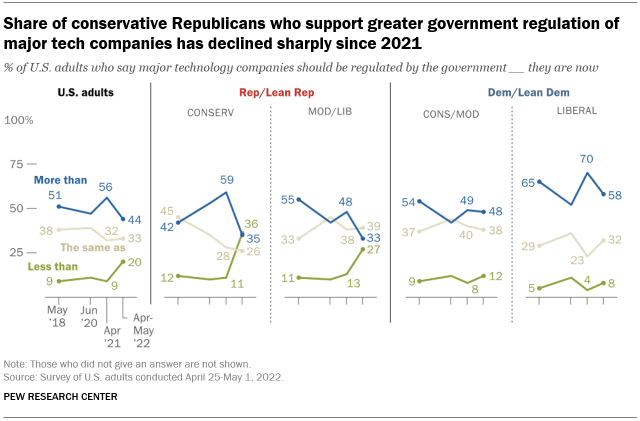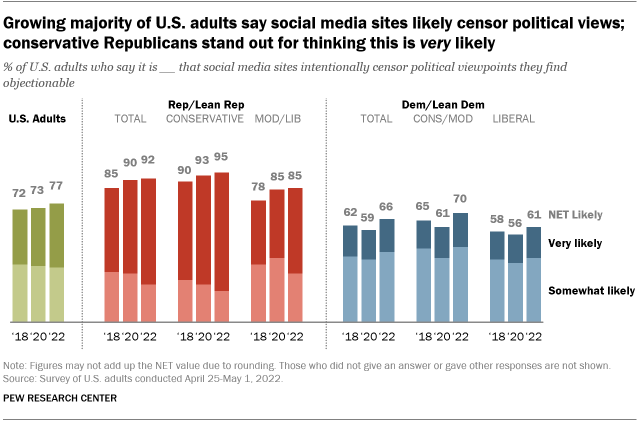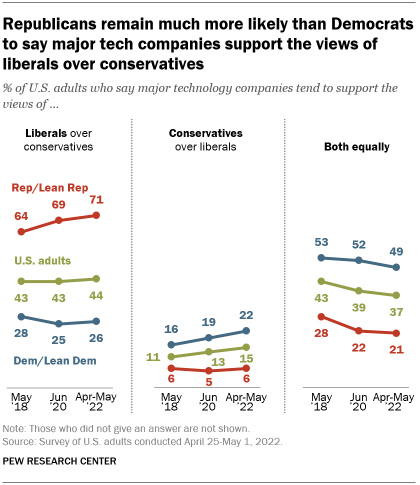A declining share of Americans favor more government regulation of major technology companies, according to a new Pew Research Center survey. Still, a plurality of U.S. adults favor greater regulation of these companies, and a large majority believe it is at least somewhat likely that social media sites censor political viewpoints they find objectionable.
Overall, 44% of Americans think major technology companies should be regulated more than they are now, down from 56% in April 2021. Conversely, the share of Americans who say they want less government regulation of major technology companies has roughly doubled, from about one-in-ten (9%) in previous years to one-in-five today.

Pew Research Center has long studied Americans’ views of whether and how technology companies should be regulated and the potential impacts of these decisions on Americans’ digital lives. To understand what Americans think about major technology companies, we surveyed 5,074 U.S. adults from April 25 to May 1, 2022.
Everyone who took part in the survey is a member of the Center’s American Trends Panel (ATP), an online survey panel that is recruited through national, random sampling of residential addresses. This way, nearly all U.S. adults have a chance of selection. The survey is weighted to be representative of the U.S. adult population by gender, race, ethnicity, partisan affiliation, education and other categories. Read more about the ATP’s methodology.
Here are the questions, responses and methodology used for this analysis.
These changes are particularly pronounced among Republicans and independents who lean toward the Republican Party, especially those who identify as conservative. In 2021, 59% of conservative Republicans said they favored greater regulation of major tech companies, but the new survey shows that share has dropped to 35%. In that same time, there was a 25 percentage point jump in the share of conservative Republicans who say there should be less government regulation of major technology companies, from 11% to 36%.
Moderate or liberal Republicans follow a similar pattern – though less dramatic in scale. Among these Republicans, support for more regulation of big tech companies has fallen from 48% in 2021 to 33% today, while support for less regulation rose from 13% to 27%.
Liberal Democrats’ support for more regulation of tech firms has dropped as well, from 70% last year to 58% now. However, there has not been a corresponding rise in the share of liberal Democrats who want less regulation of these firms. Instead, there has been an increase in the share of liberal Democrats who say that the current level of government regulation for major tech companies is about right, from 23% in 2021 to 32% today.
These findings come amid Elon Musk’s back-and-forth contemplation of buying Twitter for $44 billion. Musk has stated that if he does purchase the social media platform, he plans to take a more relaxed approach to regulating content on the platform, claiming he wants Twitter to be a beacon of free speech and avoid censorship. He has also said he would reverse former President Donald Trump’s ban from Twitter.
In the new survey, a majority of Americans believe social media companies are censoring political viewpoints they find objectionable. Rising slightly from previous years, roughly three-quarters of Americans (77%) now think it is very or somewhat likely that social media sites intentionally censor political viewpoints they find objectionable, including 41% who say this is very likely.

Majorities across political parties and ideologies believe these sites engage in political censorship, but this view is especially widespread among Republicans. Around nine-in-ten Republicans (92%), including GOP leaners, say social media sites intentionally censor political viewpoints that they find objectionable, with 68% saying this is very likely the case. Among conservative Republicans, this view is nearly ubiquitous, with 95% saying these sites likely censor certain political views and 76% saying this is very likely occurring.
By comparison, far fewer Democrats and independents who lean toward the Democratic Party believe it is very (21%) or somewhat (45%) likely that social media sites censor viewpoints they find objectionable.
Among Republicans, perceptions of censorship by social media firms have been growing slowly but consistently in recent years. The share of Democrats who perceive censorship on the part of social media companies has risen since 2020 and is now comparable to the share who did so in 2018 (66% today vs. 62% then).
More believe major tech firms tend to support the views of liberals over conservatives than believe the opposite

When asked which political views are given preference by major technology companies, a 44% plurality of Americans say these companies tend to support the views of liberals over conservatives – on par with the shares seen in previous years. By comparison, just 15% say these companies favor the views of conservatives over liberals. Still, about four-in-ten (37%) say major tech companies tend to support the views of conservatives and liberals equally – a share that has slightly fallen over the years.
Opinions about which views are shown favoritism differ widely based on partisanship. About seven-in-ten Republicans (71%) say major technology companies favor the views of liberals over conservatives, while about a quarter of Democrats (26%) say the same. Democrats are more likely than Republicans to say these companies support the views of liberals and conservatives equally (49% vs. 21%) or that conservative views are favored (22% vs. 6%).
Over the past four years, a rising share of Republicans say major tech companies favor liberal views over conservative views, while the share of Republicans who say major tech companies treat both sides equally has slightly fallen. There has been a slow increase in the share of Democrats who think these companies favor conservative views over liberal ones, but as in past years, very few Republicans say this.
There are again notable differences in these views when accounting for political ideology. For example, 81% of conservative Republicans say big technology companies favor liberal views, compared with about half of moderate or liberal Republicans (53%) and even smaller shares of conservative or moderate Democrats (27%) and liberal Democrats (24%).
About a quarter of liberal Democrats (27%) say major technology companies favor conservative views over liberal views, up from 16% in 2018. Regardless of ideology, only about one-in-ten Republicans or fewer share that view.
Note: Here are the questions, responses and methodology used for this analysis.